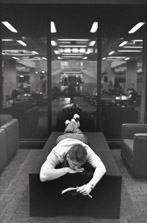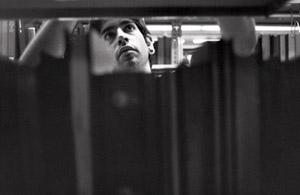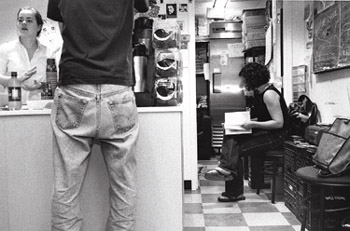Home,
home in the Reg
>> Love
it or hate it, College students still live at the library.
 For
Ray Gadke, the Joseph Regenstein Library is more than a building-it
is home. Every morning at 7 a.m., Gadke walks into the empty library.
Wearing his trademark Hawaiian shirt, he slips on his sandals,
reads the Chicago Tribune, and makes his rounds on the
third floor, turning on microform machines and tidying up tables
and shelves for the morning crowd.
For
Ray Gadke, the Joseph Regenstein Library is more than a building-it
is home. Every morning at 7 a.m., Gadke walks into the empty library.
Wearing his trademark Hawaiian shirt, he slips on his sandals,
reads the Chicago Tribune, and makes his rounds on the
third floor, turning on microform machines and tidying up tables
and shelves for the morning crowd.
Head
of the microforms department, Gadke, AM'66, has worked at the
library since it first opened in 1971, and after 30 years he no
longer notices the 4 million books or the 2,897 study spaces.
He sees the library in anthropological terms-as a microcosm of
the University. In this 577,085-square-foot cultural petri dish,
Gadke, a former social-sciences lecturer, studies the strange
behaviors, social patterns, and life of the College student.
More
than 804,000 students, faculty, and staff swipe through the library
turnstiles each year and, on average, 2,258 per day. That number
fluctuates from the busiest day, Tuesday-when up to 3,500 students
fill the library, cramming for exams and racing to finish papers-to
the slowest day, Saturday-when the same students, minds numb from
the week's work, will go anywhere but the library and do anything
but study.
There
are rumors around campus of students who never leave the library-those
who have found intellectual nirvana in the Regenstein's hidden
corners and now meditate on Plato, organic chemistry, and linear
algebra in straight 12-hours sets. But for the average student,
the library is less a temple and more a dorm away from dorm. Many
spend whole days there. Most have picked a favorite floor and
table and claimed them as their own.
What
is it about the library that moves so many to call it home? I
decide to find out, walking in Gadke's footsteps past the deeply
grooved limestone walls, through the turnstiles, and into the
world commonly known at the University as the Reg.
Among
the regulars on this particular Tuesday late in fall quarter,
Ben Carroll, a comparative-literature concentrator, finds his
spot on the fourth floor with practiced familiarity. "I practically
live at the Reg," explains the fourth-year. "It's my
one-stop place for socializing, napping, and researching. At my
dorm there's too much distraction. Harper's too social. And Crerar's
too quiet," he adds, dissing both the College's Harper Memorial
Library and the science divisions' John Crerar Library. "The
Reg has just enough distraction."
The
most tempting distractions are the plush sofa chairs by the windows
on every floor. Their soft red, blue, and gray seats beckon the
weary student. "Sleep," they seem to say.
A veteran library sleeper, Catherine Shim hears the call all the
time and says she responds all too often. Her favorite technique
is pulling together two chairs and catching blissful Zs between
the cushions. "But I can just fall asleep anywhere,"
says Shim, '03. "Tables are good too. You just have to make
sure you don't drool." And for that eventuality, Carroll
offers this advice: "If you put your sweater on top of a
Harrap's French dictionary, it makes a perfect pillow."
Demonstrating
a different technique on the fifth floor, Vikram Nidamaluri sits
before his laptop, head in his hands, closed eyes still facing
the screen. He has fallen asleep writing a paper due the next
day. When he wakes up, the first-year smiles wanly and explains,
"I haven't slept the last two days…tonight I'm averaging
30 minutes per paragraph, so just two more hours and I'll be done."
The
fifth floor has a reputation for hard-core students like Nidamaluri.
Offering texts from distant Asian countries, the floor itself
is an exotic land. During final exams, students' desks seem more
like makeshift dorm rooms, complete with personal minilamps, alarm
clocks, blankets, and pillows.
Yuh
Wen Ling, a die-hard fifth-floor fan, sets up her cubicle with
a laptop, CD player, headphones, and fluffy jacket for a pillow.
"But I'm not that bad," the third-year whispers, pointing
to others around her. "I know some on this floor who even
keep a change of clothes and toothpaste in their lockers."
The
beige lockers, stacked four high, stretch in long rows throughout
the library. Each stands about seven books high, 20 books wide,
and five deep, but even that's not enough for Colleen Daly, who
is considering a second locker. She seems slightly embarrassed
as she turns the latch to reveal a cubby overflowing with texts.
She rented the $4-per-year locker when she started on her B.A.
thesis over summer. With the thesis due soon, Daly, '02, has studied
in the Reg every day of fall quarter, holing up in her favorite
cubicle with a stack of books. Staring at the piles still waiting,
Daly sighs, "There are definitely times when I feel like
I should be doing more."

Like
the smell of books, such guilt seems to permeate the Reg's atmosphere.
With computers, friends, and sofa chairs conveniently near, students
are always just an e-mail, conversation, or nap away from procrastination.
Alejandro Ortiz, another library regular, says guilt is useless
and unproductive. He considers himself a guru of sleeping and
studying at the library-skills he's been developing since high
school. "When I fall asleep studying, I wake up automatically
in 20 minutes," he says. "It's like my body just knows
I can't afford to miss time."
An
orderly person who keeps his glasses wiped clean and his hair
brushed in neat lines, Ortiz has strict study habits. He sets
up books, fruit, and a water bottle at his table and checks e-mail
beforehand so he won't have excuses to get up. After three years
in the College, Ortiz has his cramming formula down pat. "Past
18 hours of work, the perfect nap is an hour and 15 minutes,"
he explains. "Your learning curve decreases the more sleep-deprived
you get."
Like
most students, Ortiz describes his chosen study spot in personal
terms. "I'm a third floor kind of guy," he says. The
third floor represents a compromise-a Taoist balancing of priorities.
"It gets quieter the higher you go up, but the pretty girls
are usually on the lower floors."
Walking
through the different levels, I see the Reg's social pockets unfold
like layered civilizations in an archaeological dig. History graduate
students pore over their research on the third floor. Members
of the Greek system dominate the second. On the first floor a
group of Asian students discusses its migration this year from
the second floor. "A little noise is good," says one.
"Two's always been overrated anyway."
The
basement's upper floor, A-level, is mostly filled with economics
majors and business school students. For every person who passes
through the double-door entrance, students glance up from their
books, and the new entries are either dismissed or filed away
for future reference. Longtime A-leveler Dan Egel, '02, notes,
"The girls are always looking at the guys, and the guys are
definitely looking at the girls."
The
library has always been the social center of the campus, says
Gadke-who was a graduate student when the Reg first opened-"so
it becomes the arena when people want to deliver a message or
want an audience." During the student protests in the 1970s,
he recalls people pulling fire alarms almost every day, and every
spring fraternity pledges streaked naked through the library.
In the 1980s there were reports of a shoe thief prowling the Reg,
preying on students who removed their shoes to study. According
to Gadke, when police eventually caught the culprit, they found
his apartment overflowing with footwear.
In
the most recent prank library staff remember-besides the track
team's annual streaking, which they try to forget-two years ago
students sneaked in small chickens and set them loose on the third
floor. Tyjuan Edwards, who was working at the circulation desk,
remembers seeing the little balls of fluff. "I didn't have
to catch them myself," says Edwards. "Not that I'm scared.
I just don't like grabbing livestock."

Study
purists, who shun this social side of the Reg, find refuge in
the book stacks on the west half of every floor but the first.
The stacks' abandoned rows of books are ghostly silent, except
for the steady hum of the ventilation. Student worker Angela Zielinski
is one of the few inhabitants of this dark underworld. The second-year
glides between rows, jamming to her headphones while shelving
returned books. "At night it gets a little creepy because
it's so quiet and dusty," she admits. "But you get a
lot of time to think. I work on math problems while shelving.
I take Attic Greek too, so sometimes I decline nouns in my head."
Every
year the library system hires 235 student workers like Zielinski
to do everything from cataloguing new books to uploading scanned
texts. Most jobs pay $8.67 to $9.27 an hour, but some, requiring
specialized skills such as language translation, cross the $10
mark.
The
book stack department hires the most students, 45 per quarter,
and for the long-distance shelver the job can often be depressing
and lonely. Full-time managers give frequent pep talks to motivate
student workers and encourage shelving together to ward off boredom.
"It can be a depressing job because the books just keep coming
and never end," Zielinski says. "You have to remind
yourself that what you do is important…. It's like Plato-shelving
is for the common good, for the good of the state."
Over
time the job becomes a test of the soul and will. For some, long-term
exposure makes them indifferent to the cause. For others, the
work becomes an almost sacred task. "For people with obsessive-compulsive
tendencies like me, it's a perfect job," says Zielinski.
"I think of myself as the guardian of books."
If
shelvers are the Reg's sacred guardians, workers at Ex Libris
are the sacrilegious jesters. Manager Lauren Kroiz says the student-run,
University-funded coffee shop is much more than a business. "I
don't know if it's really a charity, business, or support group,"
says the fourth-year art-history concentrator. "It's like
a club where people come to hang out." Most of the staff
show off their Ex Libris pride by wearing the shop's eX logo on
backpacks, pants, and T-shirts. White and gray eX socks dangle
from the door, a handwritten sign offering them for $2 a pair.
Located
just below the lobby, the eccentric café is covered with
other quirky, homemade signs. A Polaroid by the Thai food shows
an employee squished onto the bottom rack of the fridge. The caption
reads, "Where are your children right now?" Another
sign in orange and black warns, "What if napkins were made
of people?!?…YOU COULD BE NEXT!"
The
shop is famous for its edgy personality, says Cian O'Day, who
has worked there for two years. "We pride ourselves on giving
our customers a little attitude. I mean, what's more memorable:
a 'please' and 'thank you' or throwing a curveball in their day
that will stick in their minds?"

Some
of the curveball pranks have become legendary among employees.
O'Day, a history concentrator, opens the file cabinet to show
a Saran-wrapped plastic cup labeled "Gene's soul." He
explains that bored employees once advertised free food for customers
willing to sell their souls. "We ended up getting eight or
11 souls before we got in trouble with the manager," says
the fourth-year. "Needless to say, most of the signers were
people from the B-school and Law School."
"But
it's all serious work now," claims O'Day, while another employee
smirks and shakes her head behind him. The conversation among
staff slowly drifts to faith in God and disillusion with society
to boyfriends and strange customers.
"We talk about the customers a lot," admits Susan Catapano,
a second-year employee. "Everyone knows Decaf Guy,"
she says, referring to a customer who exclusively buys raisins
and decaffeinated coffee. "Then there's Excessively Meek
Woman, The Three Nice Ladies, and Medium Man."
"And
Quarter Man," adds O'Day. "He buys one bagel, takes
like 14 things of cream cheese, and wants all our new quarters…you
know, the ones with state landmarks. But he's really nice-nice
but eccentric."
The
description fits the employees just as well as the customers.
The workers find themselves at the shop-even on days they don't
work-just to hang out and check in with their friends. Relaxing
in a chair in the back room, Catapano explains, "The library
is my home. This is just my living room."


![]()
 For
Ray Gadke, the Joseph Regenstein Library is more than a building-it
is home. Every morning at 7 a.m., Gadke walks into the empty library.
Wearing his trademark Hawaiian shirt, he slips on his sandals,
reads the Chicago Tribune, and makes his rounds on the
third floor, turning on microform machines and tidying up tables
and shelves for the morning crowd.
For
Ray Gadke, the Joseph Regenstein Library is more than a building-it
is home. Every morning at 7 a.m., Gadke walks into the empty library.
Wearing his trademark Hawaiian shirt, he slips on his sandals,
reads the Chicago Tribune, and makes his rounds on the
third floor, turning on microform machines and tidying up tables
and shelves for the morning crowd.

